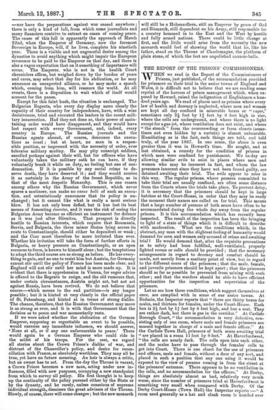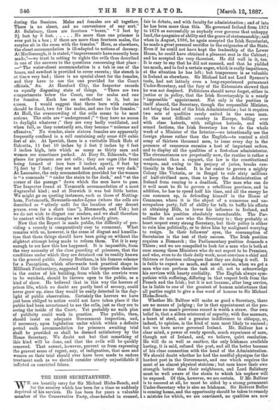THE REPORT OF THE PRISONS' COMMISSIONERS.
WHEN we read in the Report of the Commissioners of Prisons, just published, of the accommodation provided for prisoners on their trial in the assize towns of England and Wales, it is difficult not to believe that we are reading some reprint of the horrors of prison management which, when ex- posed by Howard, raised the indignation of Englishmen a hun- dred years ago. We read of places used as prisons where every law of health and decency is neglected, where men and women are kept all day confined in miserable boxes or " cages," sometimes only 2i feet by feet by 8 feet high in size, where the cells are underground, and where there is no light except for a gas-jet, where ventilation does not exist, and where " the stench " from the overcrowding or from closets (some- times not even hidden by a curtain) is almost unbearable. Humiliating as is the fact, such things are told, and told truly, of the year 1887. In one sense, the abuse is even greater than it was in Howard's time. He sought, and at last obtained, a remedy for the condition of prisons in which men were confined for punishment. We to-day are allowing similar evils to exist in places where men and women who may be innocent in fact, and whom the law presumes innocent since they have not been found guilty, are detained awaiting their trial. The evils appear to arise in this way. The regular prisons, where persons committed to take their trial are usually confined, are often some distance from the Courts where the trials take place. To prevent delay, it is necessary that the prisoners should be kept in large batches at the Court-House, in order that they may be ready the moment their names are called on for trial. This means that a large number of persons of both sexes have often to be accommodated during the whole day away from the regular prisons. It is this accommodation which has recently been inspected. The result of the inspection has been the bringing to light of a state of things which it is difficult to describe with moderation. What are the conditions which, in the abstract, any man with the slightest feeling of humanity would demand for men and women only accused of crime and awaiting trial? He would demand that, after the requisite precautions as to safety had been fulfilled, well-ventilated, properly lighted rooms or cells should be provided ; that the necessary arrangements in regard to decency and comfort should be made, not merely from a sanitary point of view, but in regard to the different sexes of the prisoners ; that the male, female, and juvenile prisoners should be kept apart ; that the prisoners should as far as possible be prevented from mixing with each other ; and that the warders should be able to have efficient opportunities for the inspection and supervision of the prisoners.
Let us see how these conditions, which suggest themselves at once, are complied with in some of our assize towns. At Bodmin, the Inspector reports that " there are thirty boxes for males, and thirteen for females, under the Court-House. Each box is 24 feet by 11 feet by 8 feet high, and has a seat. They are rather dark, but there is gas in the corridor." At Carlisle Borough Court, " the accommodation is very defective, con- sisting only of one room, where male and female prisoners are massed together in charge of a male and female officer." At the Carlisle Town Hall, prisoners of both sexes awaiting trial "are placed in a room 11 feet by 8 feet." At Haverfordwest, "the cells are nearly dark. The cells open into each other, and the males have to pass through the females' cells to get into Court. There is one closet for the use of prisoners and officers, male and female, without a door of any sort, and
placed in such a position that any one using it would be
exposed to the view of persons coming in from the street at the prisoners' entrance. There appears to be no ventilation in the cells, and no accommodation for the officers." At Derby, things are absolutely almost as bad, relatively very much worse, since the number of prisoners tried at Haverfordwest is something very small when compared with Derby. Of the Derby Court-House (Town Hall) the Inspector reports :—" A room used generally as a hat and cloak room is handed over during the Sessions. Males and females are all together. There is no closet, and no convenience of any sort." At Salisbury, there are fourteen "boxes," " 3 feet by 21.- feet by 8 feet No more than one prisoner is ever put in a box ; if there are more than fourteen males, the surplus it in the room with the females." Here, as elsewhere, the closet accommodation is ill-adapted to notions of decency. At Marlborough, it is stated," improvements have recently been made,"—we trust in setting to rights the evils thus described in one of the answers to the questions concerning that place : —" The water-closet accommodation is a tub in one of the boxes, and sawdust is provided to cover excreta ; the stench is at times very bad ; there is no special closet for the females, and they have to use the one provided for the Court officials," &c. At Hereford City, the Inspector records an equally disgusting state of things. "There are two eDmpartments below the Court, one for males and one for females. Each has an earth-closet in it, but no screen. I would suggest that three bars with curtains should be fixed, two for the males, and one for the females." At Hull, the overcrowding of the cells seems to be most serious. The cella are " underground ;" " they have no access to daylight whatever ;" they are very badly ventilated, and when full, as they constantly are, they become " noisome and offensive." No wonder, since sixteen females are apparently frequently confined in a cell containing only some 426 cubic feet of air. At Ipswich, there is a veritable Black Hole of Calcutta, 11 feet 10 inches by 5 feet 2 inches by 6 feet 3 inches high, into which as many as thirty men and women are sometimes packed. At Bury St. Edmunds, " the places for prisoners are not cells ; they are cages (the front being formed of iron bars 3 inches apart), 8 feet by 71- feet by 7 feet ; they are not heated, and are very dark." At Lancaster, the only accommodation provided for the women is " a commode " " under the stairs to the dock," and " at the corner of the passage" down which the men have to pass. The Inspector found at Yarmouth accommodation of a most disgraceful kind ; and at Norwich it was but little better. We might go on quoting instances, such as those of Notting- ham, Portsmouth, Newcastle-under-Lyme (where the cells are described as " utterly unfit for the location of any decent person, even for a short time "), Monmouth, and Usk ; but we do not wish to disgust our readers, and we shall therefore be content with the examples we have already given.
Now that the Report is made public, the difficulty of pro- viding a remedy is comparatively easy to surmount. What remains with us, however, is the sense of disgust and humilia- tion that these things should have been going on without the slightest attempt being made to reform them. Yet it is easy enough to see how this has happened. It is impossible, from the very necessity of the close guarding of prisoners, that the conditions under which they are detained can be readily known to the general public. Jeremy Bentham, in his famous scheme for a Panopticon, which afterwards took practical shape in Milbank Penitentiary, suggested that the inspection chamber in the centre of his building, from which the convicts were to be watched, should be thrown open to the public, as a kind of show. He believed that in this way the horrors of prison life, which no doubt are partly bred of secrecy, could never grow up, since they would be easily detected in the day- light of public observation. Certainly the horrors we have just been obliged to notice could not have taken place if the public had been accustomed to see the cells, just as they are to seeing the inside of the Court. Yet probably no such plan of publicity could work in practice. The public, then, should insist on adequate Government inspection, and, if necessary, upon legislation under which within a definite period such accommodation for prisoners awaiting trial shall be provided as shall be deemed satisfactory by the Home Secretary. We doubt not but that something of this kind will be done, and that the evils will be quickly removed. That cannot, however, prevent us from expressing the gravest sense of regret, nay, of indignation, that men and women on their trial should ever have been made to endure treatment such as we should consider utterly unjustifiable if inflicted on convicted felons.



































 Previous page
Previous page